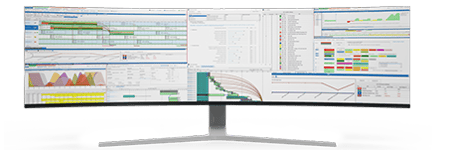Managing Inventory and Pricing Strategies
As an Operations Director in a pharmaceutical manufacturing facility, managing inventory and pricing is a critical balancing act. It’s essential to maintain sufficient stock levels to meet demand without incurring excessive carrying costs, all while ensuring pricing remains competitive yet profitable.
In an industry where product expiration, regulatory compliance, and fluctuating demand are constants, effective inventory and pricing strategies are not just operational objectives—they’re strategic imperatives.
Integrating advanced planning and scheduling (APS) tools like PlanetTogether with robust enterprise resource planning (ERP) systems such as SAP, Oracle, Microsoft, Kinaxis, or Aveva can be transformative in addressing these challenges.

The Importance of Effective Inventory and Pricing Management in Pharmaceutical Manufacturing
In pharmaceutical manufacturing, inventory management goes beyond the typical considerations of balancing supply and demand. Here, it’s about maintaining the integrity and availability of life-saving products, managing expiration dates, and ensuring compliance with stringent regulatory standards. Pharmaceutical products are often costly to produce, and inventory levels need to be carefully monitored to avoid both shortages that could disrupt patient care and overstocking that could lead to waste due to product expiration.
Pricing strategy, too, plays a vital role. Given the high costs of research and development and the complex distribution networks, pricing needs to be carefully managed to reflect the true value of the product while remaining accessible in the market. This delicate balance is especially important as pressure mounts from healthcare providers, insurers, and regulators to keep drug prices reasonable.

Inventory Management Challenges in the Pharmaceutical Sector
Pharmaceutical manufacturing faces unique inventory challenges, including:
Regulatory Compliance and Quality Control: Maintaining compliance with regulatory standards, including Good Manufacturing Practices (GMP), is essential. This requires traceability across the entire supply chain, from raw materials to the finished product.
Expiration and Shelf Life: Pharmaceutical products have limited shelf lives, making inventory management complex. Excess inventory risks expiration, while insufficient inventory risks production delays and stockouts.
Demand Variability: Demand for pharmaceutical products can be highly volatile due to factors like seasonality, health crises, and shifts in market competition.
Costly Raw Materials: Many raw materials in pharmaceuticals are high-cost or scarce, making efficient use of materials crucial to minimize expenses.
Stringent Storage Requirements: Pharmaceuticals often require specific storage conditions (e.g., temperature and humidity control), necessitating careful handling and monitoring across the supply chain.

Pricing Strategy Challenges in the Pharmaceutical Sector
Pricing strategies in pharmaceuticals face several unique pressures as well:
High Research and Development (R&D) Costs: The high costs of R&D need to be recouped, impacting pricing decisions.
Market Competition: With the emergence of generics, pricing strategies need to be adaptive to maintain competitiveness.
Pricing Transparency: Pressure from regulatory bodies and healthcare providers for pricing transparency requires pharmaceutical companies to adopt pricing models that can withstand scrutiny.
Value-Based Pricing: As more payers push for outcomes-based pricing, there is increasing pressure to align prices with the therapeutic value of products.
![]()

The Role of Technology: Integrating PlanetTogether with ERP Systems
To manage these inventory and pricing challenges effectively, integrating PlanetTogether’s advanced planning and scheduling (APS) capabilities with ERP systems like SAP, Oracle, Microsoft, Kinaxis, or Aveva can provide a holistic, data-driven approach. This integration enables real-time data flow across production, inventory, and financial management systems, delivering greater visibility and control over the inventory and pricing strategies. Here’s how PlanetTogether-ERP integration can support pharmaceutical manufacturers:
Enhanced Inventory Visibility and Control
Integrating PlanetTogether with your ERP provides an end-to-end view of inventory levels across all locations and supply chain nodes. This visibility helps in:
Improving Forecasting Accuracy: With a clear understanding of current stock levels, historical data, and demand forecasts, you can make informed decisions on production volumes and avoid overproduction or underproduction.
Reducing Expired Inventory: By tracking product expiration dates in real time, you can prioritize the use or shipment of products with shorter shelf lives, minimizing waste.
Optimizing Stock Levels: With a unified data view, you can set optimal reorder points based on demand forecasts, reducing stockouts and excess inventory.
Streamlined Production Scheduling
PlanetTogether’s APS capabilities allow pharmaceutical manufacturers to align production schedules with real-time demand, balancing production costs with service levels. When integrated with ERP systems, this synchronization helps in:
Responding to Demand Fluctuations: Real-time production scheduling enables agile responses to sudden demand changes, ensuring stock availability for high-demand products while minimizing unnecessary production.
Optimizing Resource Allocation: By considering constraints like machine availability, raw material supply, and labor, you can optimize the use of resources, reducing downtime and increasing throughput.
Reducing Lead Times: PlanetTogether’s APS can help identify bottlenecks in the production process, enabling you to implement targeted improvements and reduce overall lead times.
Data-Driven Pricing Strategy Support
With accurate data on production costs, inventory levels, and demand forecasts, pharmaceutical manufacturers can develop data-driven pricing strategies that reflect real-time market dynamics. By integrating PlanetTogether and your ERP system:
Cost Analysis Becomes More Precise: You can capture accurate production and inventory holding costs, providing insights into cost structures and enabling more informed pricing decisions.
Enabling Flexible Pricing Models: Access to real-time data enables you to experiment with pricing models such as value-based pricing or cost-plus pricing. This adaptability is especially useful for drugs with variable demand patterns or highly competitive markets.
Enhanced Transparency for Stakeholders: A unified data flow across systems enables transparent pricing models, which can improve relationships with stakeholders and meet regulatory demands for clarity in pricing.
Risk Mitigation and Compliance Assurance
Integration between PlanetTogether and ERP systems supports risk mitigation by ensuring that inventory, production, and pricing align with regulatory standards and quality controls. This integration can aid in:
Automating Compliance Reporting: With real-time data on production processes and inventory, it’s easier to generate compliance reports, reducing the manual effort required for regulatory adherence.
Improving Traceability and Quality Control: Integrated systems enable full traceability across the production process, ensuring that quality standards are met at every stage and that any compliance risks are quickly identified and mitigated.
Managing Price Controls: Some markets have price controls on essential drugs, and an integrated system can ensure that your pricing strategy complies with these regulations without impacting profitability.

Best Practices for Integrating PlanetTogether with ERP Systems in Pharmaceutical Manufacturing
Implementing integration between PlanetTogether and ERP systems requires a strategic approach to ensure successful adoption and to maximize the benefits of combined APS and ERP capabilities. Here are some best practices:
Establish Cross-Functional Collaboration: Ensure alignment between the production, supply chain, and finance teams to leverage the full benefits of APS-ERP integration. Collaboration will foster a shared understanding of inventory and pricing objectives.
Prioritize Data Quality: For accurate inventory and pricing insights, data quality is crucial. Regular data validation and cleansing should be a part of the integration process to ensure that all inputs are reliable.
Invest in Training: Training teams on both PlanetTogether and ERP functionalities will enable them to make the most of the integrated system, especially when making time-sensitive decisions related to production schedules and pricing adjustments.
Monitor Key Performance Indicators (KPIs): Define KPIs that align with your strategic objectives for inventory and pricing. Regularly monitor KPIs such as inventory turnover, service level, cost-per-unit, and pricing margins to ensure the integration delivers expected outcomes.
Plan for Scalability: Ensure that the integration setup can scale with your facility’s growth. As your production scales or diversifies, the integration between PlanetTogether and your ERP system should support evolving requirements.
Managing inventory and pricing strategies in pharmaceutical manufacturing demands both precision and flexibility. With the integration of PlanetTogether’s APS capabilities with ERP systems like SAP, Oracle, Microsoft, Kinaxis, or Aveva, Operations Directors can enhance visibility, control, and responsiveness across inventory and pricing decisions. By automating data flows, improving real-time visibility, and enabling proactive planning, this integration provides a powerful tool to mitigate risks, optimize costs, and align pricing strategies with both market demands and regulatory requirements.
Leveraging technology to manage inventory and pricing effectively can be the differentiator that drives profitability and ensures a steady supply of critical pharmaceuticals to the market. Embracing this integrated approach is not just about operational efficiency; it’s about strategic readiness to face the challenges of an evolving industry.
Are you ready to take your manufacturing operations to the next level? Contact us today to learn more about how PlanetTogether can help you achieve your goals and drive success in your industry.
Topics: PlanetTogether Software, Integrating PlanetTogether, Streamlined Production Scheduling, Pharmaceutical Manufacturing, Enhanced Inventory Visibility and Control, Data-Driven Pricing Strategy Support, Risk Mitigation and Compliance Assurance




















LEAVE A COMMENT